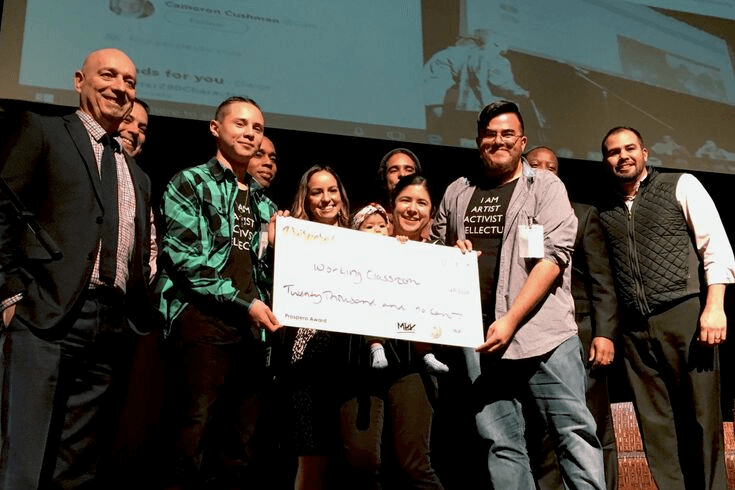Grant Has Unexpected Results for ABQ’s Young Men of Color

Prospéro program in Albuquerque gets praise from the Obama Foundation
A grant program out of Albuquerque is getting national attention for exceeding expectations. Not only did the Prospéro grantees meet their target goals, the unintended outcomes were even more surprising and impressive.
“It’s the most effective social justice grant program we’ve funded,” said Kelli Cooper, Vice President of the Albuquerque Community Foundation.
In 2018, the Prospéro Award, an initiative of the Albuquerque Community Foundation, City of Albuquerque and the My Brother’s Keeper Alliance (a program of the Obama Foundation), awarded a total of $100,000 to five community programs in Albuquerque. The initiative focused on accelerating job opportunities for young men of color.
According to the Albuquerque Equity Report, our city’s racial income gap continues to widen as a result of three decades of wage decline and stagnation. The report finds that people of color have higher levels of poverty and working poverty than Whites. Their research shows that Native Americans have the highest rate of working poverty, at 20 percent. African Americans, Latinos, people of mixed or other races, and Asian or Pacific Islanders all have working-poverty rates that are at least double the rate of their White counterparts.
The reality of this wealth gap becomes increasingly grave as we project into the future. Albuquerque — like much of the country — is seeing a growing racial generation gap. People of color have a median age of 25, while Whites have an average age of 47 — a 22-year difference. As this large cohort of youth of color ages into the workforce, the education, training and support they receive now will have a huge influence on our future economy.
Prospéro grantees have made some impressive strides, from a measured increase in the number of people of color in the technology industry, to giving rise to new viable pathways to higher-wage industries. Prospéro-initiated job opportunities cultivated local talent, allowing young men of color to apply newly acquired skills to work on real-life, paid projects.
Short-Term Impact
For example, Cultivating Coders expanded their 10-week coding bootcamp. The cohort of 16 young men of color had a 100 percent rate of completion. Upon graduation, many of these young men were granted freelance contracts with the City.
Three Sisters Kitchen established and expanded a formal network of men of color in the food industry to provide mentorship, modeling and guidance in food careers, as well as hands-on cooking workshops.
Fathers Building Futures graduated 75 young men of color from their job training program. One hundred percent received employment upon completion. Additionally, 14 participated in a savings program where dollars were matched toward starting a business, home ownership or returning to school.
New Day enrolled 52 young men of color in their Life Skills Academy, a program for at-risk, homeless and disconnected youth; 89 percent completed the term and 87 percent were placed in work experience opportunities.
Eight young men of color completed fellowships with Working Classroom, averaging 168 hours in artistic engagement and entrepreneurial projects. All fellows completed four paid internships, receiving professional training in visual and new media arts, financial literacy and marketing.
Unexpected Outcomes
Over the course of the grant period, the relationships among the partner organizations became deeply interwoven. As the grantees identified overlap between their organizations, they took the initiative outside the stipulations of the grant to open their doors to each other.
Working Classroom offered its creative arts program to the participants at New Day, who had just aged out of the foster system. Similarly, Cultivating Coders offered to partner with Fathers Building Futures so that young men of color learning coding skills could assist in building a database to streamline their social enterprise system.
“These collaborations fell well outside of the actual grant—but they’re the unexpected outcomes we always hope will develop when grantees have an opportunity to speak to each other and join forces,” said Joanna Colangelo, Albuquerque Community Foundation’s Community Impact Director.
The final impact report was submitted to the Obama Foundation at the end of August, with the hope that results from the Prospéro program can help to inform similar efforts across the country.
“We’re extremely pleased with these results,” said Colangelo. “This is real grassroots work that deserves national recognition.”
Connect the Dots
City Alive connects organizations across sectors to align efforts that close the gap in business ownership and leadership with a focus on people of color. Prospero is one example of how two City Alive partners (the Albuquerque Community Foundation and the City of Albuquerque) collaborated on a program dedicated to just that. Read about other initiatives in the City Alive family that are increasing capital access and prioritizing local businesses.





